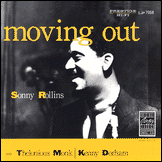All of the cuts from this session are Rollins originals, and they cover a lot of territory. "Movin' Out" and "Swinging for Bumsy" are blistering bebop excursions, then the beautiful ballad, and finally the midtempo "Solid."
Dorham and Hope are right with Rollins all the way through, and that takes some doing, because all of the solos are seriously inventive throughout. "Movin' Out" is a succession of rapid-tempo solos, starting with Sonny, and these guys aren't just answering each other, they're answering themselves, playing off their own ideas and finding new directions within each solo. Elmo Hope is the perfect piano player to keep pace and create his own complex improvisations.
 In "Swinging for Bumsy," they keep the fire going, ratcheting up the tempo another notch, and this time using short unison bursts to transition from one solo to the next. Art Blakey, due to an equipment malfunction, was playing without his
high-hat cymbals that day, which for a bebop drummer is like a spitball
pitcher being cut off from his slippery elm, but it doesn't slow him down, and he contributes a powerful solo on "Swinging for Bumsy."
In "Swinging for Bumsy," they keep the fire going, ratcheting up the tempo another notch, and this time using short unison bursts to transition from one solo to the next. Art Blakey, due to an equipment malfunction, was playing without his
high-hat cymbals that day, which for a bebop drummer is like a spitball
pitcher being cut off from his slippery elm, but it doesn't slow him down, and he contributes a powerful solo on "Swinging for Bumsy."Hope is deep and expressive on his ballad solo, and it's one of the emotional highlights of the session.
Rollins and Dorham only play one extended unison part, on the "Solid" head, but they're never far apart. They would come together again two years later as part of the revamped Max Roach Quintet, after the death of Clifford Brown.
Dorham and Hope both died young. Hope, one of the most adventurous and experimental players and composers of the bebop era, survived (particularly worthy of mention with today's headlines being what they are) being shot by a cop as a teenager. Throughout much of his life he battled heroin addiction, and it finally beat him. Dorham died of a kidney disease.

 I had thought of both Dorham and Hope as sort of second generation beboppers, coming along in the 50s and 60s, but in fact they were both there from the beginning. Dorham joined Mercer Ellington's band in 1945, at age 21, then followed Dizzy Gillespie as the lead trumpeter in Billy Eckstine's famous band, and from there moved on to Gillespie's band. By the time he made these recordings with Sonny Rollins, he had played with Sonny Stitt, Fats Navarro, Lionel Hampton, Mary Lou Williams and J. J.
I had thought of both Dorham and Hope as sort of second generation beboppers, coming along in the 50s and 60s, but in fact they were both there from the beginning. Dorham joined Mercer Ellington's band in 1945, at age 21, then followed Dizzy Gillespie as the lead trumpeter in Billy Eckstine's famous band, and from there moved on to Gillespie's band. By the time he made these recordings with Sonny Rollins, he had played with Sonny Stitt, Fats Navarro, Lionel Hampton, Mary Lou Williams and J. J. Johnson, and had had an extended stint with Charlie Parker.
J. R. Monterose, who played with Dorham on his classic 'Round about Midnight at the Cafe Bohemia album, told me that Dorham was the best leader he had ever played with.
These were released on a 10-inch LP titled Sonny Rollins Quintet featuring Kenny Dorham, and on a 12-inch titled Moving Out, which added the "g" to the first word, and added an extended jam featuring Thelonious Monk.

No comments:
Post a Comment